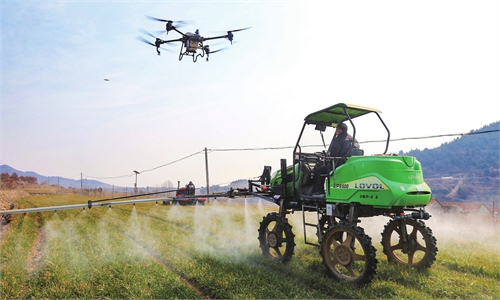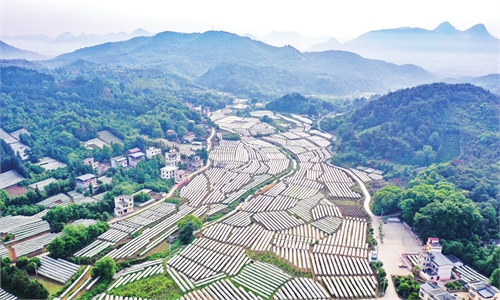IN-DEPTH / IN-DEPTH
Xi's words greatly encourage new wave of tech-savvy farmers to dedicate themselves to rural revitalization
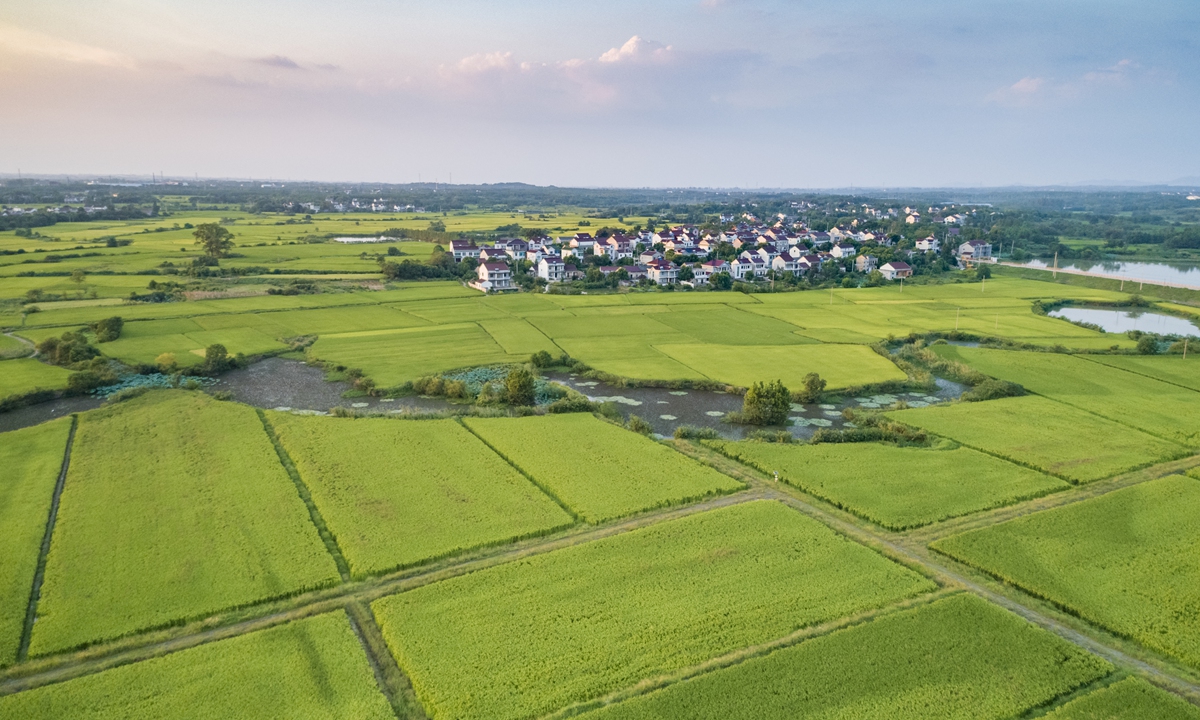
Photo: VCG
China feeds nearly one-fifth of the world's population with only 9 percent of the world's arable land.Guiding small-scale farmers onto the track of modern agriculture while ensuring food security has been repeatedly stressed by Chinese President Xi Jinping on multiple occasions in recent years, during which he has placed great emphasis on promoting agricultural modernization as being the foundation of a great modern socialist country.
Wei Qiao, a representative of a new crop of innovation-driven agricultural pioneers, has pledged to actively participate in smart farming, after she was recently applauded by President Xi for having amassed a treasure trove of experience in modernizing agricultural practices.
After sharing her experience with President Xi of managing more than 20,000 mu (1,333 hectares) of rice farmland digitally and how such a move has been financially beneficial to the farmers in her hometown, Wei was praised and encouraged by Xi when he communicated with his fellow deputies from the Jiangsu Province delegation at the first session of the 14th National People's Congress (NPC), the country's top legislature, on March 5.
Xi stressed to safeguard China's red line of 120 million hectares of farmland, keep sown area at a stable level, increase the area of high-standard cropland, and secure the stable and safe supply of grain and important agricultural products. He also stressed to take industrial development as the top priority of rural revitalization, encouraged new industries and new forms of businesses in rural areas, so as to create more channels for farmers to increase their incomes, the Xinhua News Agency reported.
As Xi spoke, part of a new chapter of China's agriculture modernization was being unveiled in Zhenjiang, East China's Jiangsu Province, more than 1,000 kilometers away from Beijing.
Building an agriculturally strong country is a major strategic goal first proposed by the 20th National Congress of the Communist Party of China (CPC) held in 2022. Jiangsu - also known as the "land of fish and rice" since ancient times - can leverage its advantages to lead the nation to the accomplishment of this goal.
During his meeting with NPC deputies from Jiangsu, Xi stressed to leverage the strengths of science and technology and to advance reform of the rural land system, cultivate new types of agribusiness and commercial agricultural services, so as to inject momentum and vitality into the agricultural and rural development, Xinhua reported.
Xi's words have greatly encouraged new technologically savvy farmers like Wei and her husband Sun Zhenzhong to devote themselves to the rural revitalization strategy.
"President Xi's instruction proposed the direction to developing modern agriculture and increased our confidence in technologically improving the quality and yield from our farmland," said Wei, chairman of a large-scale agricultural mechanization cooperative in Zhenjiang.
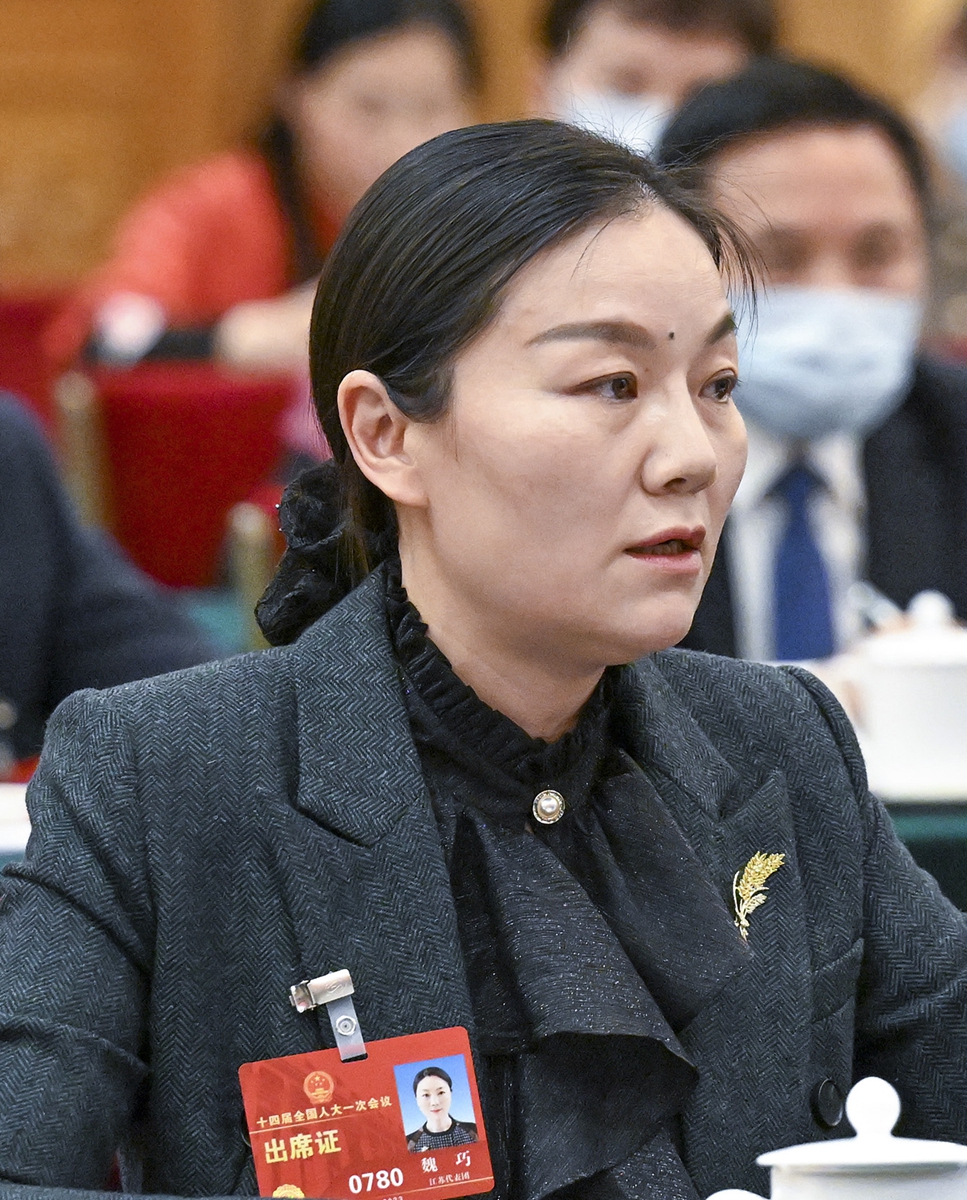
Wei Qiao, an NPC deputy from Jiangsu Province Photo: Xinhua
An unusual decisionHow are farmers' incomes? What is the progress of the cooperative? Is farming highly mechanized? Xi has shown great care about Wei's cooperative, after listening to Wei's stories of returning from the urban city with her husband to the countryside where they engage in modern agricultural production.
"He was really concerned about issues related to agriculture, rural areas, and farmers. What moved me even more was that President Xi said we need a large number of talented people and a high-quality labor force to promote rural revitalization, and that he feels good when witnessing people like me going back to the countryside. He said that in this regard, the government will provide further guidance and more forms of policy support," Wei told the Global Time, noting that Xi's words made her more determined to care more for farmers.
In April 2017, Wei, who was working as an assistant researcher at the Chinese Academy of Sciences in Beijing, and Sun, who was a post-doctoral fellow at Peking University, both quit their jobs and returned to Wei's hometown in Jiangsu, where they became experts in digital farming.
"Back in December 2014, President Xi inspected Zhenjiang and encouraged local well-known agricultural expert Zhao Yafu to apply his scientific research to finding practical solutions to social problems. At that time, my father, who was a large-scale grain producer in Zhenjiang, made a call to me that night and asked if I could come back to my hometown to take his place in solving the practical problems facing our country, like Zhao did, which really convinced me. That encouraged me to make my final decision to leave my previous research post and return to my rural hometown to implement my father's wishes," Wei recalled.
"When I told President Xi how I made the decision, he looked at me in a way that was very similar to that of my father back then," said Wei.
Industrial revitalization also relies on the revitalization of talent. How talent can be incentivized to return back to rural areas, Wei asked.
"The modern countryside is a land of great promise, a field of hope," Xi said in 2019.
From Xi's words, Wei has gained a deep understanding of the agriculture, rural areas, and farmers.
"Agriculture has never been an easy mission, as it requires a large investment and hard work, with a slow return. So the government has long been thinking about how to encourage more young people to enter the field of agriculture, Wei said.
In recent years, subsidy policies have been introduced to support new farmers to start their own businesses in their own hometowns."
From 2012 to the end of 2022, 12.2 million people returned to their hometowns to start businesses, according to official statistics.
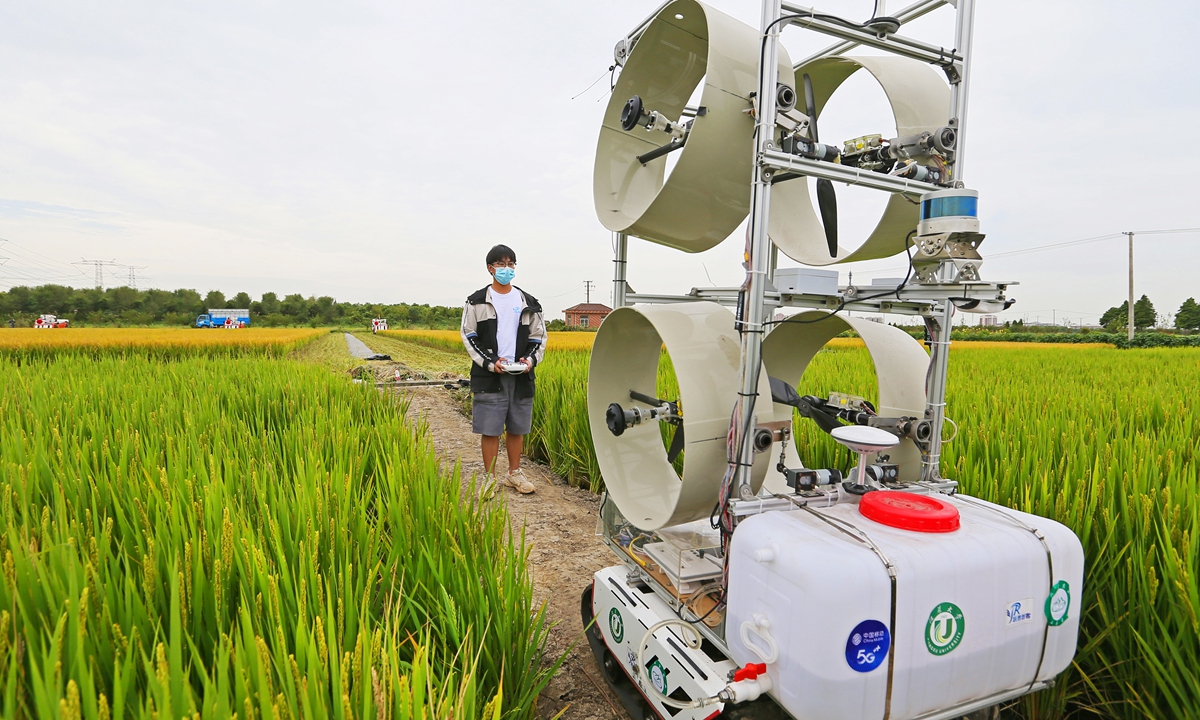
A member of an agricultural cooperative in Shanghai demonstrates how to operate a robot spray machine on September 21, 2022. Photo: VCG
Smart agriculture takes off
Over the last decade, great progress has been made in agricultural mechanization, smart agriculture has taken off rapidly, and rural e-commerce has emerged as a new force in productivity in China.
"The whole process of agricultural production mechanization is the most important aspect of agricultural modernization in realizing digital and intelligent production in the future," Wei told the Global Times.
Wei and her husband Sun have ramped up efforts to mechanize and digitize the entire farming process. Supported by remote-controlled sensors, for example, Wei segmented the whole farm into 1,107 sections and digitally coded each section to track the progress and basic conditions of the soil, in order to precisely control the amount of fertilizer and agrochemicals used in the field.
"After a period of analysis, we found that technology speaks for itself. Only by applying modern technologies such as natural Geographic Information System (GIS), unmanned vehicles, and remote-controlled sensor data to agricultural production can we more accurately assess climate impacts, appropriately use fertilizers, and plan in advance for future cultivation," Wei explained.
Wei believes that China has high-quality hardware and software systems, but application in agriculture is still relatively rare. Wei kept approaching experts across a variety of research fields in various institutions and universities, to work out a unique prototype for use in digital agriculture.
Through her attempts, a loop-locked, modern agricultural production system that integrates farming, seeding, management, harvesting, drying, storage, processing, marketing, and output, has taken shape in her agricultural cooperative.
In 2022, Wei also worked with six scientific research teams from Jiangsu University to carry out experiments on unmanned agricultural machinery, grain drying, intelligent irrigation, farmland drainage, and automatic warning systems for the detection of crop diseases.
"As we are witnessing, a rapidly aging and shrinking workforce has been a challenge in most rural areas. A mechanized and digital agriculture mode is more crucial in securing the supply of food and major agricultural products," Wei told the Global Times.
Data from the seventh national census shows that 73.12 percent of the rural laborers who are engaged in agriculture, forestry, animal husbandry, and fishery are above the age of 45, and 92.65 percent of those within the said demographic have only attained a junior high school-level education or below.
"Obviously, a small-holder system with an aging, modestly educated workforce cannot support an agricultural powerhouse," said Wei.
Now, via the modern system, Wei has provided more than 10,000 farmers with technical training, having lifted more than 3,000 rural people out of poverty
"We are now exploring the construction of digital eco-farms to build a sustainable agricultural pattern, to ensure food security, and to inspire more 'new farmers' to join us in the development of a modern rural China," Wei said in a hoarse yet delighted voice.
"In recent years, we have revitalized small and medium-sized farms in the surrounding areas through resource sharing, we appealed to college students to enter farms to gain credits through offering them training under a cooperative scheme, and explored entrepreneurial opportunities in new farms," Wei told the Global Times.
Wei wishes to extend her digital farming web to more countries. While receiving support from Jiangsu University's Belt and Road international cooperation network, Wei plans to set up agricultural science and technology demonstration bases in countries along the Belt and Road routes, share her farm experience and practices in Africa, Southeast Asia, Eastern Europe, and in other regions, and weave her dream of modern agriculture into the wider world.
Yue Mingchunxiao contributed to the story

